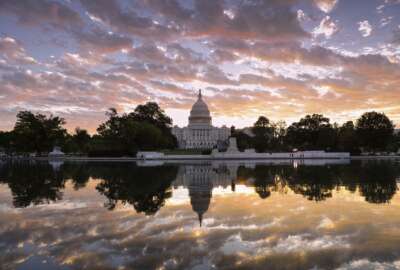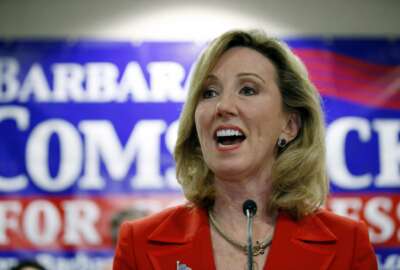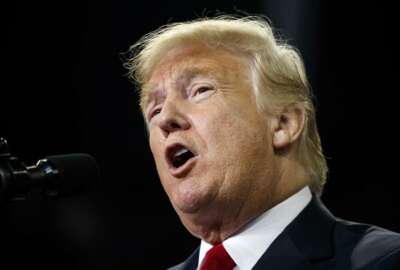
House Republicans say they’re on track to give federal employees a pay raise next year
House Republicans said they've reached a tentative deal on a federal pay raise for 2019. Federal employee unions and House Democrats, however, are cautious about...
House Republicans said Thursday they’ve struck a tentative deal on a federal pay raise for civilian federal employees in 2019.
The raise would mirror the Senate’s proposed 1.9 percent average raise — and matches what federal employees received in 2018.
The Washington Post first reported the news of a tentative deal on federal pay.
Rep. Barbara Comstock (R-Va.) said she has been discussing the idea with her Republican colleagues for the past month. She’s also reached out to the White House.
“With this strong economy we have right now, increasing the pay and being competitive is an important way of keeping a quality federal workforce,” she said in an interview with Federal News Radio.
A spokesman for Rep. Tom Graves (R-Ga.) confirmed lawmakers had struck an agreement on a federal pay raise for 2019. Graves, who serves as chairman of the House Appropriations Financial Services and General Government subcommittee, also praised Comstock for her work in securing an agreement.
Comstock was one of the first House Republicans to appeal to President Donald Trump and oppose his proposed pay freeze for civilian employees next year.
Though some House Republicans were quick to announce a deal had been struck, a 1.9 percent pay raise is far from a done deal.
The House won’t return from recess until Nov. 13, after the mid-term elections. Graves’ spokesman said lawmakers will finalize the conference report, which is expected to contain language authorizing the federal pay raise, after mid-terms.
Graves is also a conferee negotiating a third minibus of appropriations bills. The financial services and general government bill is a part of those minibus discussions.
“I don’t know the exact date of things, but I’m confident that now it is going forward,” Comstock said when asked about the timing of a final bill.
The Senate had included and passed a 1.9 percent pay raise for civilian employees in 2019 in its version of the financial services and general government appropriations bill. The House, however, has remained silent on the topic, sending House and Senate lawmakers to conference over their differences.
As of last week, negotiations over a conference report and federal pay had stalled. A House Democratic aide had told Federal News Radio that a decision on federal pay wasn’t expected until after mid-terms, if not after the current continuing resolution for some federal agencies runs out on Dec. 7.
Sen. James Lankford (R-Okla), who, as chairman of the Senate Appropriations Financial Services and General Government subcommittee, helped push a 1.9 percent raise through the Senate, also praised the deal.
“I encourage my colleagues in both the House and the Senate to complete work on the remaining appropriations bills soon so we can give clarity to our federal families,” he said Thursday.
Yet news of the agreement earned mixed reactions from Democrats.
“The House and Senate Republicans have agreed on an approach, but the minority corners did not agree,” Tara Vales, a spokeswoman for Rep. Mike Quigley (D-Ill.), told Federal News Radio. “Democrats strongly support a pay increase for federal workers, however, we do not believe that partisan provisions should be conditional for the deal.”
Quigley is the ranking member on the House Appropriations Financial Services and General Government subcommittee and is also a conferee on the final bill.
But Rep. Gerry Connolly (D-Va.) offered mostly praise and said Congress was “doing the right thing.” Congress should, instead, “stop their attack on federal workers, including government shutdown threats and the unjustified use of the Holman Rule,” he added.
The National Active and Retired Federal Employees (NARFE) Association has been working with members of Congress, including Comstock, on the federal pay raise. After hearing reports that lawmakers had reached an agreement, the organization said it was “cautiously optimistic.”
“While this appears to be a step in the right direction, we recognize this development is not final and that elements in the agreement may change when the Senate and the House reconvene after the upcoming midterm elections,” NARFE President Richard Thissen said.
The National Treasury Employees Union (NTEU) echoed NARFE’s words of caution.
“It is not something to celebrate just yet,” NTEU National President Tony Reardon said in a statement. “Congress’s work on remaining 2019 appropriation bills will not happen until after the midterm elections, and no pay raise is final until it’s approved by both chambers and signed by the president. Hopefully this will happen before the continuing resolution expires Dec. 7 and a partial government shutdown is avoided.”
The president, of course, must actually sign a final appropriations bill into law. Citing the “nation’s fiscal situation,” Trump had originally indicated in August that he planned to freeze pay for civilian employees in 2019.
“The fight goes on until this tentative agreement becomes law,” Del. Eleanor Holmes Norton (D-D.C.) said.
Comstock said she hadn’t discussed the agreement with House Democrats yet and wasn’t aware of any other terms or riders that were conditional to an agreement on federal pay.
“I’ve just been working through my appropriations colleagues and playing in with the White House, so any other pieces of it were not part of it that I was engaged in,” she said. “They didn’t bring any other issues up to me. They knew when they saw me or when I was talking to them what my focus was.”
Copyright © 2025 Federal News Network. All rights reserved. This website is not intended for users located within the European Economic Area.
Nicole Ogrysko is a reporter for Federal News Network focusing on the federal workforce and federal pay and benefits.
Follow @nogryskoWFED






